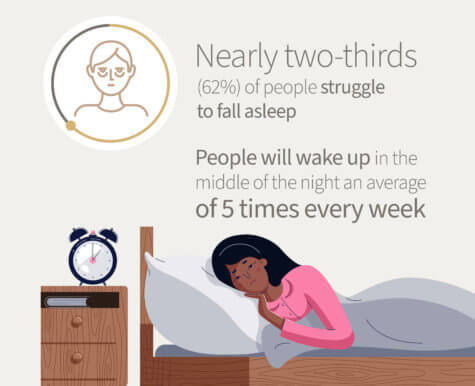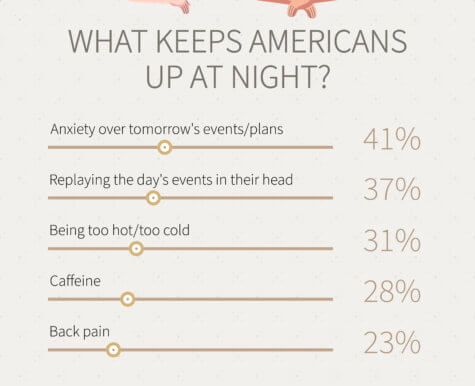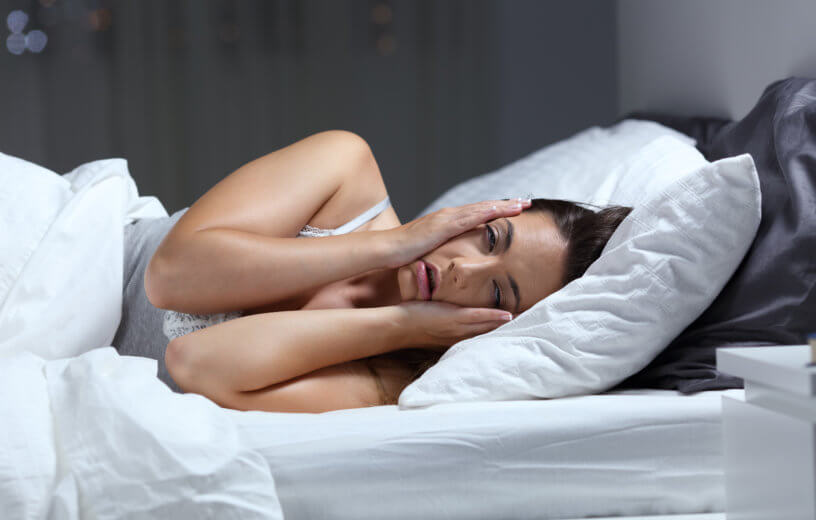NEW YORK — Think the stress of 2020 only affects you when you’re awake? Think again. A OnePoll study of 2,000 Americans finds four in 10 people (41%) are up all night due to “next day anxiety” — fearing the uncertainty of what tomorrow will bring.
Nearly two-thirds of Americans (62%) struggle to fall asleep each night. Along with anxiety about the future, replaying the past day’s events (37%), being too hot or too cold (31%), and having too much caffeine before bed (28%) all get part of the blame for keeping people awake.
Several respondents even named other factors such as feeling uncomfortable in bed, being too itchy, or having a fear of nightmares as the reason they can’t fall asleep. For 101 respondents, their dogs are to blame for keeping them up at night. Only 77 cat owners made the same claim about their furry friend.
More than a quarter of Americans (27%) have been diagnosed with a sleeping disorder. The most common disorders among them are insomnia (45%), sleep apnea (44%), and restless leg syndrome (17%). Although 73 percent of the poll have never been diagnosed with a sleeping disorder, a third of them have spouses or partners that insist they have a sleeping disorder of some kind.
Americans can’t stay asleep at night
 Commissioned by mattress company Saatva, the survey looked into the sleeping habits (or lack thereof) of Americans and some of the strange incidents that wake people up. Researchers discovered that the average respondent will wake up in the middle of the night five times every week. When they wake up, 63 percent say they struggle to go back to sleep.
Commissioned by mattress company Saatva, the survey looked into the sleeping habits (or lack thereof) of Americans and some of the strange incidents that wake people up. Researchers discovered that the average respondent will wake up in the middle of the night five times every week. When they wake up, 63 percent say they struggle to go back to sleep.
Anxiety isn’t always to blame for waking people up at night. Americans listed a plethora of odd events that jolted them out of a deep sleep. Some of the strangest include having cockroaches landing on their heads, having an orgasm in their sleep, rolling out of bed, slamming their head into a wall, and even wetting the bed.
Some of the tricks to getting great sleep and staying asleep, according to respondents, include a little bit of wine, cannabis edibles, aromatherapy, reading, using a nasal rinse, and watching boring documentaries on television. The most important trick, however, is simply finding a way to get comfy.
Sleep is all about comfort
People will rely on a lot of things to get comfy in bed. Top among them include a favorite pillow (54%) or blanket (50%). Other comforting items include having the right mattress (38%) and having their partner next to them (28%). On average, Americans take 27 minutes to fall asleep. More than a third (37%) fall asleep in less than 15 minutes. For 11 percent of Americans however, it takes over an hour.
“I tell people that they have to view sleep as an activity and prepare for it, the same way they would if they were going to work out or play a sport,” says Saatva CEO Ron Rudzin in a statement. “I make sure that the temperature of the room is right, it has to be extremely dark, I turn off all my electronics about 15 minutes beforehand, I take a warm shower before I go to sleep. I do the same preparation for sleep every single night because I know how important it is.”
Even dreams in 2020 were stressful
 The survey also finds nearly eight in 10 people (78%) have had dreams that felt real to them. These vivid dreamers say they have an average of nine realistic dreams per month. When asked to describe these dreams, several respondents said they had vivid dreams of lost relatives, being back in school, being at work, and being attacked by random animals or things.
The survey also finds nearly eight in 10 people (78%) have had dreams that felt real to them. These vivid dreamers say they have an average of nine realistic dreams per month. When asked to describe these dreams, several respondents said they had vivid dreams of lost relatives, being back in school, being at work, and being attacked by random animals or things.
These types of realistic, stressful dreams seem to be on the rise as well. Half of Americans report they have had more stress-related dreams over the last year than ever before. When asked to identify the source of their stressful dreams, one in three respondents point to the current pandemic and money woes as the culprits (36%). Another 32 percent said earlier events of the day also rank high as a stressor.
Several respondents add their stress dreams come from more unorthodox sources. Those include having a specific phobia, past traumatic experiences, not having their kids or family members nearby, and fear of upcoming, anxiety-inducing events.
“That’s why it’s so important to relax your body and mind before trying to sleep, especially these days. It can be more than just keeping the bedroom a dark, quiet and cool space,” according to the experts at Saatva. “Other stress-busting things to incorporate into your bedtime routine are gentle stretches, deep breathing or meditation, smelling lavender, even making a to-do list for the next day. If all else fails, you can always try a weighted blanket, which has been shown in lab studies to help people suffering from insomnia fall—and stay—asleep.”
